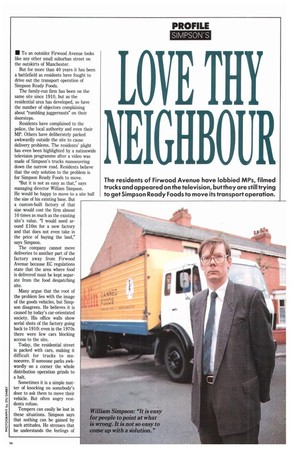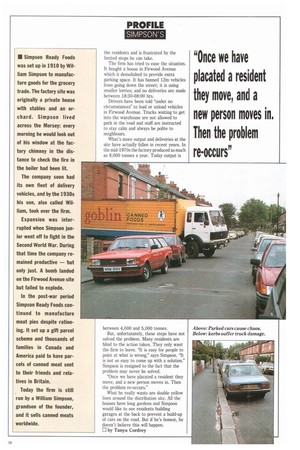LOVE THY NEIGHBOUR
Page 38

Page 40

If you've noticed an error in this article please click here to report it so we can fix it.
The residents of Firwood Avenue have lobbied MPs, filmed trucks and appeared on the television, but they are still trying to get Simpson Ready Foods to move its transport operation.
• To an outsider Firwood Avenue looks like any other small suburban street on the outskirts of Manchester.
But for more than 40 years it has been a battlefield as residents have fought to drive out the transport operation of Simpson Ready Foods.
The family-run firm has been on the same site since 1910, but as the residential area has developed, so have the number of objectors complaining about ``rumbling juggernauts" on their doorsteps.
Residents have complained to the police, the local authority and even their MP. Others have deliberately parked awkwardly outside the site to cause delivery problems. The residents' plight has even been highlighted by a nationwide television programme after a video was made of Simpson's trucks manoeuvring down the narrow road. Residents believe that the only solution to the problem is for Simpson Ready Foods to move.
"But it is not as easy as that," says managing director William Simpson. He would be happy to move to a site half the size of his existing base. But a custom-built factory of that size would cost the firm almost 10 times as much as the existing site's value. "I would need around idOm for a new factory and that does not even take in the price of buying the land," says Simpson.
The company cannot move deliveries to another part of the factory away from Firwood Avenue because EC regulations state that the area where food is delivered must be kept separate from the food despatching site.
Many argue that the root of the problem lies with the image of the goods vehicles, but Simpson disagrees. He believes it is caused by today's car-orientated society. His office walls show aerial shots of the factory going back to 1910: even in the 1970s there were few cars blocking access to the site.
Today, the residential street is packed with cars, making it difficult for trucks to manoeuvre. If someone parks awkwardly on a corner the whole distribution operation grinds to a halt.
Sometimes it is a simple matter of knocking on somebody's door to ask them to move their vehicle. But often angry residents refuse.
Tempers can easily be lost in these situations. Simpson says that nothing can be gained by such attitudes. He stresses that he understands the feelings of the residents and is frustrated by the limited steps he can take.
The firm has tried to ease the situation. It bought a house in Firwood Avenue which it demolished to provide extra parking space. It has banned 12m vehicles from going down the street; it is using smaller lorries; and no deliveries are made between 18:30-08:00 hrs.
Drivers have been told "under no circumstances" to load or unload vehicles in Firwood Avenue. Trucks waiting to get into the warehouse are not allowed to park in the road and staff are instructed to stay calm and always be polite to neighbours.
What's more output and deliveries at the site have actually fallen in recent years. In the mid-1970s the factory produced as much as 8,000 tonnes a year. Today output is between 4,000 and 5,000 tonnes.
But, unfortunately, these steps have not solved the problem. Many residents are blind to the action taken. They only want the firm to leave. "It is easy for people to point at what is wrong," says Simpson. "It is not so easy to come up with a solution." Simpson is resigned to the fact that the problem may never be solved.
"Once we have placated a resident they move, and a new person moves in. Then the problem re-occurs."
What he really wants are double yellow lines around the distribution site. All the houses have long gardens and Simpson would like to see residents building garages at the back to prevent a build-up of cars on the road. But if he's honest, he doesn't believe this will happen.
0 by Tanya Cordrey




































































































